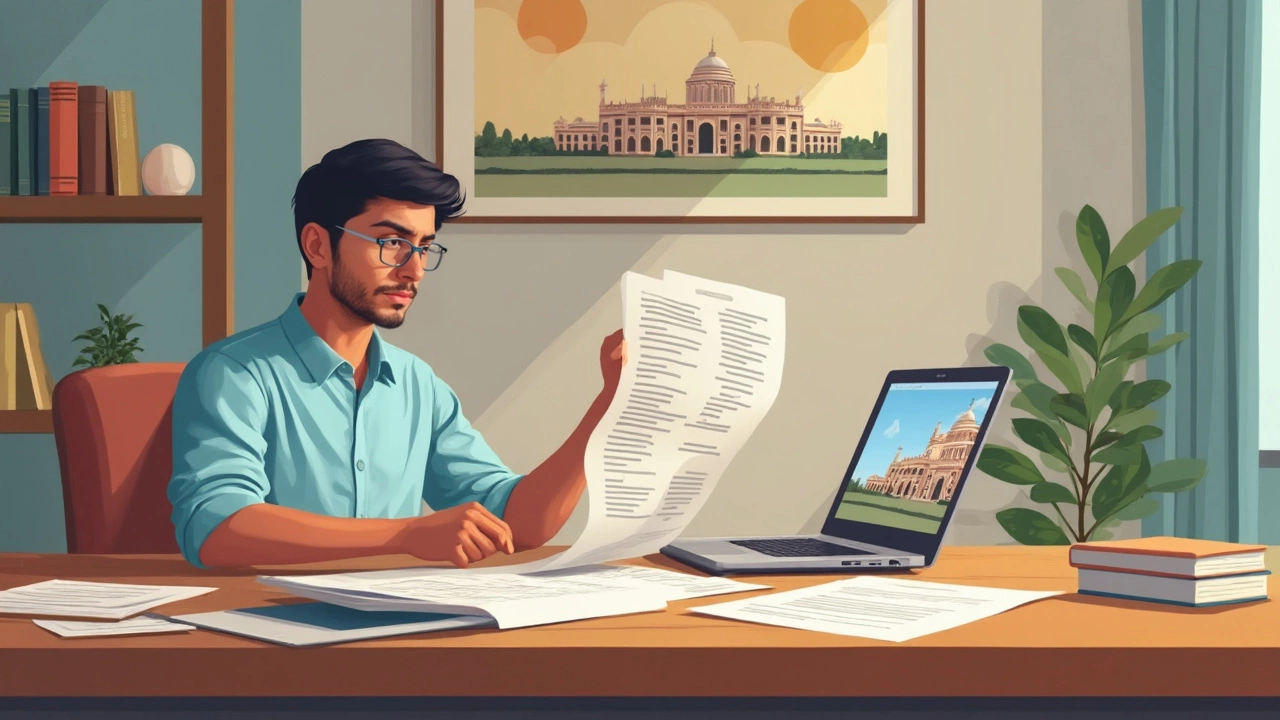Can I Buy a Resale Flat Alone? Everything You Need to Know

May, 20 2025
You don't need a partner to buy a resale flat. Single? Divorced? Just want your own space? You're good to go. Indian law doesn't stop you from owning a 2BHK apartment in your name alone. Actually, banks and real estate agents handle solo buyers every day.
But here's the catch: the process has a few twists if you’re doing it alone. For loans, you’ll need to show that you can pay up on your own—your income, your job stability, and your credit score need to look solid. No one to co-sign means banks look a bit more closely at your numbers. Don't let that throw you off; lots of people make it work.
When you're shopping for a resale flat, especially a 2BHK, there are perks to going solo. Decision-making is quicker. There's nobody to convince or compromise with. On the flipside, every decision—and every risk—sits with you. Before you jump in, knowing the basics makes things a whole lot easier.
- Who Can Buy a Resale Flat Alone?
- Steps for Solo Buyers: Process and Paperwork
- Financing: Loans and Down Payments
- Tips for a Smooth, Independent Purchase
Who Can Buy a Resale Flat Alone?
If you're wondering whether you qualify to buy a resale flat all by yourself, the answer is pretty straight: almost any adult with valid ID and enough income can do it. In India, there’s no law that says you need to have a spouse or a co-owner. You can be single, married, divorced, or widowed—the rules really don’t block anyone out based on relationship status.
Even if you’re not from India, as a Non-Resident Indian (NRI) or Overseas Citizen of India (OCI), you can buy a resale property under most circumstances. The rules for foreigners who aren’t of Indian origin are trickier, though, and usually not allowed unless they live here for a while under certain visa types. But for most people reading this, especially Indian citizens and NRIs, owning a 2BHK apartment solo is totally doable.
The basic requirements look like this:
- You need to be at least 18 years old.
- You must have valid government-issued ID (like Aadhaar, PAN, or passport).
- The money for the down payment should be from your own legal income or savings.
- If you need a home loan, your bank will look at your income, job, and credit score. (A decent CIBIL score—usually 750+—makes approval smoother.)
People from all walks do this—IT professionals, business owners, doctors, teachers, even first-jobbers who’ve been working for just a couple years. Some banks even note that about 20% of home loan applications now come from single applicants.
| Eligibility | Who Qualifies? |
|---|---|
| Indian Citizen | Yes |
| NRI/OCI | Yes (with some paperwork) |
| Foreign National (non-OCI) | Mostly No |
| Minimum Age | 18 years |
| Marital Status | Any (Single/Married/Divorced/Widowed) |
The best part? When you own the flat in your name alone, you call all the shots. There’s no one else’s signature needed during resale or renting. You’re in the driver’s seat for everything—maintenance, renovations, or even flipping the flat later on.
Steps for Solo Buyers: Process and Paperwork
Buying a resale flat alone is pretty straightforward if you know exactly what you need to do. The best part? There's no endless back-and-forth with another decision maker. Still, the steps have to be just right so you don’t get stuck later.
- Check Your Eligibility: Make sure you’re over 18, an Indian citizen (or an NRI with valid documents), and have a steady income. Lenders will ask for recent payslips, bank statements, and proof of employment.
- Shortlist and Inspect the Flat: Don’t just go by photos. Visit in person, double-check ownership, and confirm the flat isn’t under any legal dispute or loan. It helps to get the property physically measured—builder brochures might not match reality.
- Verify Title and Documentation: Get all property papers from the seller: sale deed, latest property tax paid receipts, possession letter, occupancy certificate, and encumbrance certificate for the last 15 years. These prove the flat’s history and current legal standing. Missing paperwork is a big red flag.
- Sale Agreement and Token Amount: If everything looks good, sign a sale agreement and pay a token amount (usually 1-3% of the value) to lock the deal. Make sure the agreement highlights the price, payment schedule, and possession date.
- Arrange Finances: Apply for a home loan if needed. Banks will run a credit check, and since you’re solo, your income is the only thing that counts here. Most lenders finance up to 80-85% of the property value. Get a sanction letter before you finalize anything.
- Registration and Stamp Duty: Pay stamp duty and registration fees (rates depend on the state) and get the sale deed registered in your name at the local sub-registrar’s office. This is when you officially become the owner.
- Transfer Utilities and Society Membership: Inform the housing society and utility companies about the ownership change. Change names for electricity, water, gas, and maintenance accounts to avoid future headaches.
Keep digital and printed records of every form you sign and each receipt you get. If the process feels overwhelming, hiring a property lawyer can save you from nasty surprises.

Financing: Loans and Down Payments
If you’re eyeing a resale flat solo, one of the big hurdles is sorting out your mortgage and down payment. Most banks will happily offer a home loan to a single applicant, as long as you can show you’ve got enough income to pay EMIs on your own. There’s no law that stops a single person from taking a loan for a 2BHK apartment. What banks really care about is whether you can pay every month, and that comes down to your salary, job history, and existing debts.
For a resale flat, lenders usually offer up to 75%-80% of the property’s value as a loan. So, for a flat worth ₹80 lakh, you’re likely looking at a maximum loan of ₹64 lakh. The rest—about 20%-25%—is your down payment, and you’ll need to pull that from your own savings. If the place is a bit older or if paperwork is fuzzy, sometimes banks get stricter and lower the loan amount, so be ready for that.
Here's a quick look at what banks generally ask solo buyers for:
- Proof of stable income—recent salary slips or IT returns if you’re self-employed.
- Identity and address proof (PAN, Aadhaar, etc.).
- Property documents, like the sale agreement, title deed, and NOC from the local housing society.
- Credit score—usually 750 or above gets you the best deals.
Don’t forget a few extra costs: banks charge a processing fee (often 0.5%–1% of the loan amount), and there’s stamp duty, registration, and sometimes legal checks. All these can add up, so factor them in when you’re planning.
Here’s a simple snapshot of the key numbers for solo buyers in 2025:
| Loan Feature | Typical Value |
|---|---|
| Loan-to-Value (LTV) Ratio | 75%–80% |
| Minimum Down Payment | 20%–25% of property price |
| Processing Fees | 0.5%–1% of loan amount |
| Best Credit Score | 750 and above |
| Interest Rate (2025 avg.) | 8.5%–9.3% per annum |
One savvy tip: compare offers from at least three banks before you commit. Some will knock a bit off their interest rate or reduce fees if your credit history is clean. And if you’ve got a big chunk of the down payment ready, don’t be shy to negotiate.
Tips for a Smooth, Independent Purchase
Buying a resale flat by yourself isn’t complicated, but you’ll want to keep a few things in mind to avoid surprises and extra costs. Here’s how to make the process easier, safer, and quicker when you’re going solo.
- Check property documents carefully. Always verify the sale deed, encumbrance certificate, latest tax paid receipts, and occupancy certificate. If these are missing or not original, walk away. Many solo buyers hire a property lawyer just to double-check everything. That cost often saves big trouble later.
- Visit the flat in person, more than once. It’s easy to miss dampness, old wiring, or noisy neighbors on a single visit. Daytime and evening visits give you the full picture.
- Negotiate hard. Owners of resale 2BHK flats usually expect to bargain, especially when dealing with a single decision-maker. You might shave off five to ten percent just by asking.
- Get your loan pre-approved. Banks jump through hoops when you apply as a solo buyer. A pre-approval letter before you start makes sellers take you seriously and gives you leverage.
- Don’t ignore society rules. Some apartment societies have rules about single ownership or might charge higher maintenance fees for owners living alone. Always ask upfront.
- Budget for repairs and extra costs. Unlike buying new, resale flats often need paint, plumbing, or minor upgrades. On average, buyers spend ₹1-3 lakh extra on a resale 2BHK for fixes after moving in.
If you’re curious about how solo buyers usually stack up, check this quick data:
| Step | Solo Buyer | Joint Buyer |
|---|---|---|
| Loan Eligibility | Depends only on your earnings | Combined incomes, easier approval |
| Stamp Duty & Taxes | Full amount on one name | Can sometimes split, depends on state |
| Decision-making | Faster | Needs agreement |
| Documentation | Simple, one owner | More paperwork |
The main keyword here is resale flat. Owning on your own just needs smart prep and a bit of due diligence. Take notes, ask questions, and don’t rush. The best deals go to buyers who do their homework.